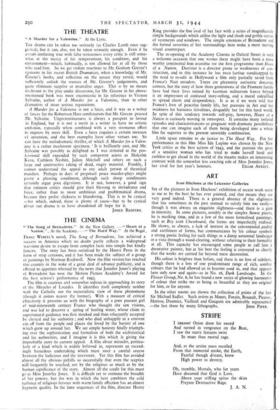THE CINEMA
"The Song of Bernadette." At the New Gallery. —" Heart of a Nation.". At the Academy.—" The Hard Way." At the Regal
FRANZ WERFECS novel, The Song of Bernadette, has achieved a success in America which no doubt partly reflects a widespread war-time desire to escape from complex facts into simple but kindly fancies. The story has been serialised by the Hearst Press in the form of strip cartoons, and it has been made the subject of a group of paintings by Norman Rockwell. Now the film version has reached this country in the wake of a great deal of advance publicity, and is offered to appetites whetted by the news that Jennifer Jones's playing of Bernadette has won the Motion Picture Academy's Award for the best actress's performance of 1943.
The film is cautious and somewhat tedious in approaching its story of the Miracles of Lourdes. It identifies itself completely neither with the Catholic nor the materialistic view of these phenomena (though it comes nearer the former). With a measure of critical objectivity it presents us with the biography of a poor peasant girl of mid-nineteenth century France who thought she saw visions, and was led to discover a spring of healing water, whose claim to, supernatural guidance was first mocked and then reluctantly accepted by clerical and lay authority ; and who died unhappily in a convent cut off from the people and places she loved by the barrier of awe which grew up around her. We see simple honesty finally triumph- ing over the sophistication and formalism of both the ecclesiastical and lay authorities, and I imagine it is this which is giving the improbable story its current appeal. A film about miracles, particu- larly of a kind which is widely believed in, represents an exceed- ingly hazardous undertaking which must steer a careful course between the ludicrous and the irreverent. Yet this film has avoided almost all the obvious pitfalls so successfully that even the sceptics will frequently be touched, not by the religious so much as by the human significance of the story. Almost all the credit for this must go to Miss Jennifer Jones. It is difficult yet to estimate the breadth of her powers, but the way in which she here combines the cold radiance of religious fervour with warm family affection has an almost hypnotic quality. In the later sequences of the film, director Henry
King provides the fine .13 val of her face with a series of magnificently simple backgrounds which utilise the light and shade and gothic curves of vestments and windows. The simple emotions of Bernadette and the formal severities of her surroundings here make a most moving visual counterpart.
The re-opening of the Academy Cinema in Oxford Street is such a welcome occasion that one wishes there might have been a more worthy continental Mtn available for the first programme than Heart of a Nation. Duvivier is a director prone to weaknesses of con- struction, and in this instance he has peen further nandicapped by the need to re-edit in Hollywood a film only partially saved from Frances Nazi invaders. 'There are pleasantly authentic domestic cameos, but the story of how three generations of the Froment family have had their lives ruined by Crerman militarism leaves behind it an impression of confused story-telling, and a moral calcuhlted to spread alarm and despondency. It is as if we were told that France's love of peaceful family life, her pleasure in Art and her weakness for harmless frivolities, disqualify her for this hard world. In spite of this tendency towards self-pity, however, Heart of a Nation is curiously moving in retrospect. It contains many isolated episodes and characterisations so pregnant with dramatic possibilities that one can imagine each of them being developed into a whole film far superior to the present unwieldy combination.
Little space remains to do justice to The Hard Way. For her performance in this film Miss Ida Lupino was chosen by the New York critics as the best actress of '1943, and the portrait she gives of a sensitive woman who has tried to make herself hard and ruthless to get ahead in the world of the theatre makes an interesting contrast with the somewhat less exacting role of Miss Jennifer Jones, her rival for last year's honours. EDGAR ANSTEY.






















 Previous page
Previous page